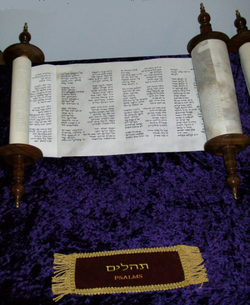| Psalm 130 | |
|---|---|
| "From the depths, I have cried out to you, O Lord" | |
| Penitential psalm | |
 De profundis, in Les Très Riches Heures du duc de Berry , Folio 70r, held by the Musée Condé, Chantilly | |
| Other name |
|
| Language | Hebrew (original) |
| Psalm 130 | |
|---|---|
| Book | Book of Psalms |
| Hebrew Bible part | Ketuvim |
| Order in the Hebrew part | 1 |
| Category | Sifrei Emet |
| Christian Bible part | Old Testament |
| Order in the Christian part | 19 |
Psalm 130 is the 130th psalm of the Book of Psalms, one of the penitential psalms and one of 15 psalms that begin with the words "A song of ascents" (Shir Hama'alot). The first verse is a call to God in deep sorrow, from "out of the depths" or "out of the deep", as it is translated in the King James Version of the Bible and the Coverdale translation (used in the Book of Common Prayer), respectively. In Latin, it is known as De profundis. [1]
Contents
- Liturgical usage
- Judaism
- Roman Catholic Church
- Coptic Orthodox Church
- Book of Common Prayer
- Literature
- Musical settings
- Latin
- English
- French
- German
- Other
- Hymns
- Text
- Latin Vulgate
- Notes
- References
- Sources
- External links
In the slightly different numbering system used in the Greek Septuagint version of the Bible, and in the Latin Vulgate, this psalm is Psalm 129.
The New American Bible Revised Edition (2010) divides the psalm into two parts: verses 1-4 are a cry for mercy; verses 5-8 are a model expression of trust in God. [2]
The psalm forms a regular part of Jewish, Catholic, Lutheran, Anglican and other Protestant liturgies. It is paraphrased in hymns such as Martin Luther's "Aus tiefer Not schrei ich zu dir" in German. The psalm has often been set to music, by composers such as Orlando di Lasso and Heinrich Schütz. John Rutter set it in English as a movement of his Requiem.

